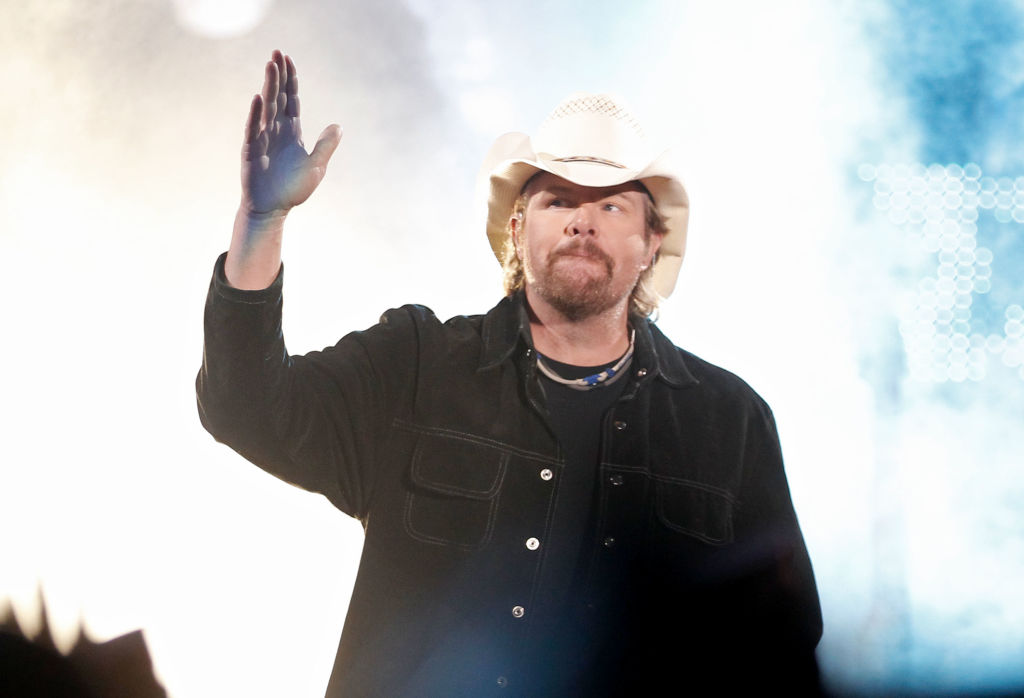Gender theorists know what they are doing when they target children. We should know what we’re doing when we fight back.
Toby Keith and Our National Story

The passing of an American bard.
Nearly fifteen years ago, country singer and songwriter Toby Keith belted out a line about a “Tidal wave comin’ ‘cross the Mexican border”—long before “Build the Wall” became a political rallying cry. Last week, Toby Keith Covel passed away from stomach cancer at the age of 62. Since the tidal wave he observed is now a tsunami, it’s worth examining how Keith’s tone and lyrical observations changed over his three-decade career.
Numerous critics—the type Keith mocked—have used his death as an opportunity to psychoanalyze his politics and subvert his message. The straight-faced assertion by the New York Times that the gruff, fun-loving musician expressed feminist undertones is ridiculous. His songs about bar fights and talkative girlfriends were not actually about “how masculinity is performance,” or a “critique of male petulance,” no matter what the Times critics might say.
And whether Keith was personally a Trump supporter or not doesn’t really matter. A lot of his listeners were, and he never spurned them à la the Dixie Chicks. Keith voiced the popular and evolving sentiments of normal, patriotic Americans—fans who in turn buoyed him to legendary status. His songs speak for themselves, and if there’s a unifying arc, it’s one of embrace but concern for the American project.
As his career kicked off in 1993, Keith’s early releases were apolitical, consisting of optimistic and nostalgic harmonies. “Should’ve Been a Cowboy” romanticizes the western frontier and extolls a California “full of whiskey, women and gold.” His album Blue Moon features slow and sad love songs. In the 2001 single “My List,” Keith appreciates the little things in life: “Raise a little hell, laugh ‘til it hurts / put an extra five in the plate at church / call up my folks just to chat / It’s time that I make time for that.”
Not until after 9/11 was Keith’s music deemed “controversial,” agitating progressive sensibilities. In the aftermath of the attacks and his father’s death earlier that year, Toby Keith “Unleashed” his emotions in the next album. He gave a fiery warning to terrorists that retribution would be “brought to you courtesy of the Red, White and Blue.” As he would admit in a 2003 interview, this song “wasn’t written for everybody.” Indeed, it was written by an “Angry American” for the “American girls and American guys” who would “always stand up and salute . . . when we see Ole Glory flyin’.”
Another single from Unleashed, “Beer for My Horses,” warned “gangsters doing dirty deeds” that they’d get theirs too: it was “time the long arm of the law put a few more in the ground.” Yet, listeners could rest assured, “we live out here in the country / Where the workin’ class do.” Normal Americans could “turn off the news / We’ll open a cold one and shake these blues.”
His 2003 hit “American Soldier” exhibits reverence and respect for a military that had not yet spurned white males. The moving tribute recognized our troops—all of them—signed up to lay down their lives for their country; they’d “bear that cross with honor ‘cause freedom don’t come free.”
The 2009 lead single in his album American Ride lyrically reflects our country’s increasing turbulence. Set to an upbeat rhythm, the song observes “plasma gettin’ bigger, Jesus gettin’ smaller,” as well as that “tidal wave” of illegals referenced earlier. In the chorus, Keith quipped, “both ends of the ozone burnin’ / funny how the world keeps turnin’.” Despite trash pop culture, fake environmental emergencies, diminished respect for Christianity, and all the rest, Keith was laughing with his listeners. The outlook was still optimistic: “gotta love this American ride.”
The lead single in his 2011 album centers on a patriotic couple who still loves but isn’t quite in sync with their country. The veteran husband doesn’t like driving “foreign cars filled with fuel that isn’t ours and wearin’ cotton we didn’t grow.” He’d “pay a little more in the store” for something made in the USA. His wife is a teacher who “decorates on the Fourth of July.” Though “some folks say it isn’t cool,” “she says the Pledge of Allegiance anyway.” As if to prebut a known criticism, the chorus reminds listeners, “He ain’t prejudiced; he’s just… made in America.” This song strikes a chord with listeners who feel a deep and abiding love for a country that was starting not to feel like home anymore.
By the time Donald J. Trump ran for President in 2015, the working-class town Keith had once described as a refuge in 2002 was now in decay. In “35 MPH Town”, “things ain’t like they used to be ‘round here.” His mother can’t “believe it, kids growing up without Jesus.” The old-timers partied too, “but now there’s a lower Higher Power in this thirty-five-mile an hour town.” Given his connection to fly-over country, it’s no surprise that Keith performed at Trump’s 2016 inauguration while his out-of-touch peers recoiled in disgust.
Even in jest, Keith’s lyrics reveal divisions in America. People might hope to bridge regional, political, racial, and cultural divides by identifying as “Drunk Americans.” At least at a bar you can avoid being “East” or “West,” “left” or “right,” “black” or “white,” “ball caps” or “turbans.” Right?
Toby Keith Covel’s last song in his final album, released in 2021, is a decidedly sober reflection on his country’s condition. On “the Fourth of July,” he’s singing “Happy Birthday” to America, but it’s “whatever’s left of you.” By this time, it “seems like everybody’s pissing on the Red, White and Blue.” America’s youth, not the Taliban, are his concern: “Now your children want to turn you in / to something other than yourself / They burn your flag in their city streets / More than anybody else.”
He levels his critiques at Democrats and Republicans: “All the broken-down cities by the Left’s design / and the Right can’t seem to get it right most of the time.” Keith loves Lady Liberty; he never wavers in his patriotism. But he’s warning her, “Without the helping hand of God, your days are numbered my old friend.”
The point isn’t that “Big Dog Daddy” was a political prophet or sage. Rather, he made common-sense observations about his beloved country—reaching legendary status in large part because those observations were shared by his millions of fans. Loudly and proudly, without apology, he espoused values indispensable to our country’s success. We should take Toby Keith’s passing as an opportunity to reflect on our country, its plight, and how to “get it right.”
The American Mind presents a range of perspectives. Views are writers’ own and do not necessarily represent those of The Claremont Institute.
The American Mind is a publication of the Claremont Institute, a non-profit 501(c)(3) organization, dedicated to restoring the principles of the American Founding to their rightful, preeminent authority in our national life. Interested in supporting our work? Gifts to the Claremont Institute are tax-deductible.
Why he belongs in the American Canon.
Stop yelling stop, and start getting to work with your friends.



